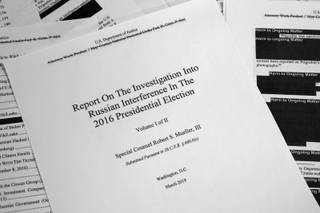Saturday, April 20, 2019 | 2 a.m.
View more of the Sun's opinion section
The report from special counsel Robert Mueller provides a devastating portrait of President Donald Trump’s behavior that may invite the beginning of an impeachment inquiry and a constitutional confrontation. A collision of some kind between the president (along with his attorney general) and Democrats who control the House of Representatives is now inevitable.
The report’s bottom line is easily lost in the details about Trump himself: that the United States has a president whom Russia actively intervened in our politics to elect. The Russian-controlled Internet Research Agency, Mueller’s report concluded, created “a targeted operation that by early 2016 favored candidate Trump and disparaged candidate (Hillary) Clinton.”
Mueller also clearly did not encourage Attorney General William Barr to end further inquiry into whether the president obstructed justice. On the contrary, Mueller went out of his way to tell Congress that it has every right to decide that issue itself. “Congress has authority to prohibit a President’s corrupt use of his authority in order to protect the integrity of the administration of justice,” he wrote.
The report will only embolden House Democrats who are already investigating the president and may increase pressure to launch formal impeachment inquiries, even though Democratic leaders have been reluctant to move in that direction.
Barr’s behavior has been shameful. From the moment he issued his letter March 24 suggesting that the final Mueller document would clear the president, Barr has behaved less like an attorney general than as a defense lawyer doubling as the president’s spokesman.
Hours after the report was released, Rep. Jerrold Nadler, D-N.Y., chairman of the House Judiciary Committee, said that “Attorney General Barr appears to have shown an unsettling willingness to undermine his own (Justice) Department in order to protect President Trump” and that Barr had been “disingenuous and misleading.” Barr’s behavior continued until the last moment before the report was made public. At a news conference that ended roughly an hour before the document was released, Barr spoke as though Mueller had resolved the entire matter in Trump’s favor and repeated the president’s battle cry, “no collusion,” four times.
But Mueller — perhaps anticipating the importance of the word “collusion” in Trump’s propaganda — was explicit in saying that “collusion is not a specific offense or theory of liability found in the United States Code, nor is it a term of art in federal criminal law.”
In fact, Mueller detailed many conversations and ties between the Trump circle and Russia. “In sum,” he wrote, “the investigation established multiple links between Trump Campaign officials and individuals tied to the Russian government. Those links included Russian offers of assistance to the Campaign. In some instances, the Campaign was receptive to the offer, while in other instances the Campaign officials shied away.”
Then came the one line in the report that Trump unambiguously liked and on which he wants to hang his entire argument: “Ultimately, the investigation did not establish that the Campaign coordinated or conspired with the Russian government in its election-interference activities.” But given the sentences that came before, it’s clear that not “establishing” conspiracy is not the same as having found no evidence of cooperation.
Here again, Mueller’s caution about leveling charges against the president still leaves Congress with ample room to probe the “multiple links” with Russia that Mueller documented.
Oddly, Trump may have been protected from even more damaging conclusions about obstruction by staff members who refused to do what he asked. “The President’s efforts to influence the investigation were mostly unsuccessful,” the report found, “but that is largely because the persons who surrounded the President declined to carry out orders or accede to his requests.” Whatever this is, it is not exoneration of Trump.
The Mueller report paints a broad picture of an administration that systematically lied to just about everybody, including the public and the media. It describes a president prepared to do whatever was necessary to close down inquiries into his behavior and Russian ties. And it noted that “some of the individuals we interviewed or whose conduct we investigated — including some associated with the Trump Campaign — deleted relevant communications or communicated during the relevant period using applications that feature encryption.”
Mueller’s findings do not end Trump’s troubles. On the contrary, he is now in greater jeopardy because we know even more about what he did. Congress must take all the further steps required to ensure accountability.
E.J. Dionne is a columnist for The Washington Post.

